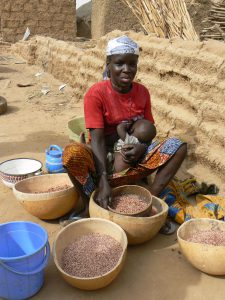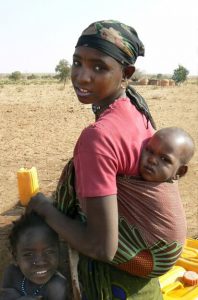by Michelle Wolf
Contaminated drinking water and nonexistent sanitation have created a health crisis in the Diffa region in southeastern Niger. Waterborne illness is a fact of life for many Nigeriens, but the supply of clean, safe drinking water in the southern part of Niger is almost unfathomably low.
In April, the Niger Ministry of Health declared an outbreak of the Hepatitis E virus (HEV) in the Diffa region of Niger. Cases of jaundice among pregnant women have been noted by Mere-Enfant de Diffa (Mother and Child Center) since January.

Woman nursing and preparing food
HEV is a liver disease that is contracted from unclean drinking water. Water is contaminated with fecal matter and transferred person-to-person. What is usually an acute but brief illness with 1% mortality rate can be deadly for those with a compromised immune system.
By May 3, 282 suspected cases of HEV had been noted in Niger. Of those suspected cases, 27 of the infected people have since died. By June 11, 186 women were admitted to the main and pediatric health center in Diffa. Pregnant women are more susceptible to severe infection, acute liver failure and have a 10% – 30% mortality rate once exposed. There is also a high risk of transmitting HEV to the fetus. 34 pregnant women have died due to severe complications related to HEV.

Young woman with children and jerry cans
Clean drinking water and proper sanitation are key for HEV prevention. Efforts to bolster improve access to safe water and bolster sanitation have been delayed due to insufficient funds and a lack of coordination between NGOs. Doctors without Borders, however, has been able to provide emergency sanitation and hygiene measures to 11 sites in Diffa. Other teams are working on 130 functional water points to ensure that water is chlorinated and that the jerry cans used to transport water are cleaned and replaced.
The government is working to create new programs to diminish this disease. WASH activities and awareness are volunteer-led efforts, strongly supported by the humanitarian organizations. With nearly 250,000 displaced people in Niger, the need of clean water is tremendous.
Sources:
http://www.msf.org/en/article/niger-hepatitis-e-outbreak-diffa-%E2%80%93-186-pregnant-women-admitted-hospital
http://reliefweb.int/report/niger/niger-hepatitis-e-virus-epidemic-outbreak-dref-operation-n-mdrne018


